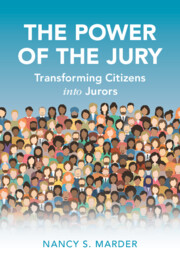Book contents
- The Power of the Jury
- Cambridge Studies in Law and Society
- The Power of the Jury
- Copyright page
- Contents
- Acknowledgments
- Introduction
- 1 The Summons and the Setting: Beginning the Transformation of Citizens into Jurors
- 2 Voir Dire: Introducing Jurors to the Judge, Their Fellow Jurors, and Their Role
- 3 Peremptory Challenges: A Barrier That Unnecessarily Limits Who Can Serve as Jurors
- 4 Jury Instructions: Reinforcing Group Identity and Making Instructions Accessible to Jurors
- 5 Jury Deliberations: Performing the Jury’s Main Task with Some Assistance from the Judge
- 6 The Post-Verdict Interview: How Judges Can Help Jurors in Their Transformation from Jurors into Engaged Citizens
- Conclusion
- Index
- Cambridge Studies in Law and Society
1 - The Summons and the Setting: Beginning the Transformation of Citizens into Jurors
Published online by Cambridge University Press: 25 August 2022
- The Power of the Jury
- Cambridge Studies in Law and Society
- The Power of the Jury
- Copyright page
- Contents
- Acknowledgments
- Introduction
- 1 The Summons and the Setting: Beginning the Transformation of Citizens into Jurors
- 2 Voir Dire: Introducing Jurors to the Judge, Their Fellow Jurors, and Their Role
- 3 Peremptory Challenges: A Barrier That Unnecessarily Limits Who Can Serve as Jurors
- 4 Jury Instructions: Reinforcing Group Identity and Making Instructions Accessible to Jurors
- 5 Jury Deliberations: Performing the Jury’s Main Task with Some Assistance from the Judge
- 6 The Post-Verdict Interview: How Judges Can Help Jurors in Their Transformation from Jurors into Engaged Citizens
- Conclusion
- Index
- Cambridge Studies in Law and Society
Summary
Chapter 1 sets the stage for the challenge that the American jury system faces. Citizens receive a jury summons requiring them to appear in court. They are often dismayed when they receive their summons. Those who heed it often do so reluctantly. The traditional view of the summons is that it is just an isolated step designed to bring a sufficient number of prospective jurors to the courthouse. The transformation view, however, is that the experience of receiving a summons and going to the courthouse are unusual events that begin to transform the outlook and behavior of those who are ultimately selected as jurors. Even at this early stage of the jury process, there are steps that courts can take to assist in the transformation of citizens into jurors. They can design summonses that are written clearly, provide answers to frequently asked questions, and reassure citizens that they do not need any special knowledge to serve as jurors. The summons, which courts view mainly as a vehicle to bring citizens to the courthouse, should instead be viewed as a form of outreach that begins the transformation of citizens into responsible jurors.
- Type
- Chapter
- Information
- The Power of the JuryTransforming Citizens into Jurors, pp. 13 - 40Publisher: Cambridge University PressPrint publication year: 2022



